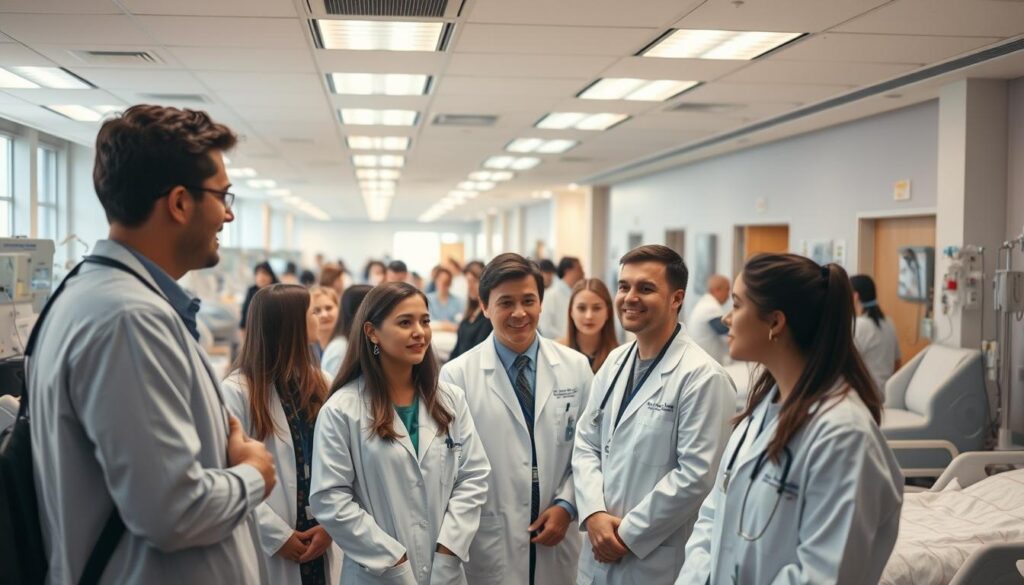Have you ever wondered how to make the most of your medical education while studying in a foreign country? For students pursuing a medical degree abroad, the journey is not just about textbooks and exams. It’s about blending theoretical knowledge with practical skills to become a well-rounded healthcare professional.
Russian medical universities are known for their structured curriculum and modern teaching methods. These institutions provide students with state-of-the-art facilities and hands-on training opportunities. This combination ensures that graduates are well-prepared for their future careers in medicine.
One of the key advantages of studying in Russia is the global recognition of the degree. This opens doors to career opportunities worldwide. Additionally, the emphasis on research and practical training helps students gain valuable knowledge and confidence in their field.
If you’re considering this path, studying MBBS in Russia could be a transformative step in your medical journey. Let’s explore how you can maximize your learning and make the most of this unique opportunity.
Introduction: Embarking on Our Russian MBBS Journey
Embarking on a medical journey in a foreign land is both exciting and challenging. For us, choosing to study medicine in Russia is a decision that promises a unique blend of academic rigor and practical exposure. The Russian medical education system is renowned for its structured curriculum and modern teaching methods, making it a preferred destination for students worldwide.
Understanding the Unique Advantages of Russian Medical Education
Russian medical universities offer a comprehensive curriculum delivered in English, ensuring that international students can easily adapt. The emphasis on both theoretical knowledge and practical training prepares us for real-world challenges. With state-of-the-art facilities and early exposure to clinical practice, we gain valuable hands-on experience even in the early years of study.
One of the standout features of studying in Russia is the global recognition of the degree. Graduates from Russian medical universities are equipped to pursue careers or further studies in various countries. The multicultural environment also enriches our learning experience, allowing us to interact with peers from diverse backgrounds.
Setting Our Educational Goals
Our primary goal is to achieve international recognition and superior clinical training. By leveraging the robust classroom foundations and practical opportunities, we aim to build a strong knowledge base. This foundation will prepare us for the detailed discussions in later sections, ensuring a well-rounded education.
| Advantages | Russian Medical Education | Other Countries |
|---|---|---|
| Curriculum | Comprehensive and English-medium | Varies by country |
| Practical Training | Early clinical exposure | Limited in early years |
| Global Recognition | High | Moderate to High |
| Cost | Affordable | Higher in Western countries |
For those considering this path, exploring affordable MBBS programs in Russia could be a transformative step in your medical journey. This section provides a foundation, preparing us for the detailed discussion in later sections.
Building a Strong Theoretical Foundation in Russian Medical Universities
The early years of medical education are crucial for building a strong theoretical base. During this time, we focus on mastering the fundamentals that will shape our future careers. Russian universities provide a structured curriculum designed to equip students with essential knowledge and skills.
Classroom Learning and Curriculum Insights
Our classroom years are dedicated to understanding the core subjects of medicine. These include anatomy, physiology, biochemistry, and pathology. Each subject is taught in detail, ensuring we grasp the concepts thoroughly. Small class sizes allow for personalized attention from experienced professors.
Russian universities are equipped with modern facilities and advanced technology. This enhances our learning experience and prepares us for practical training. The curriculum is comprehensive, covering both theoretical and practical aspects of medicine.
Importance of a Robust Academic Base
A strong academic foundation is essential for success in the medical field. It helps us understand complex concepts and apply them in real-world scenarios. Here’s how we build this foundation:
- Detailed classroom learning with a focus on fundamental sciences.
- Personalized guidance from experienced faculty members.
- Access to state-of-the-art facilities and resources.
- Comprehensive curriculum that prepares us for clinical rotations.
Studying in Russia offers the added benefit of English as the medium of instruction. This makes it easier for international students to adapt and excel. For those exploring alternatives, pursuing MBBS without NEET is a viable option.
By focusing on a robust academic base, we ensure a smooth transition to clinical practice. This foundation is the key to becoming confident and competent medical professionals.
Transitioning from Classroom to Clinical Practice
The shift from classroom learning to hands-on practice marks a significant milestone. In our third year, we begin hospital rotations, stepping into real-world medical settings. This early exposure allows us to apply theoretical knowledge in practical scenarios, bridging the gap between education and practice.

Early Exposure to Hospital Rotations
Our journey into clinical practice starts with hospital rotations. Under the guidance of experienced doctors, we interact with patients, take medical histories, and assist in examinations. This hands-on training is invaluable, helping us develop essential skills early in our education.
Rotations cover various departments, including surgery and internal medicine. This comprehensive approach ensures we gain diverse experience, preparing us for the challenges of the medical field.
Integrating Theory with Hands-On Experience
Classroom lessons come to life during rotations. We apply what we’ve learned in anatomy and physiology to diagnose and treat patients. This integration sharpens our problem-solving abilities and builds our confidence in clinical settings.
Active participation in patient care, including assisting in surgeries, enhances our practical skills. This balance between theory and practice defines our educational journey, making us well-rounded medical professionals.
For those seeking affordable tuition and high-quality medical education, institutions like Perm State Medical University offer exceptional opportunities. Their structured programs and early clinical exposure ensure we are well-prepared for our future careers.
Maximizing Clinical Experience Russian MBBS Program
Practical skills and patient interaction are key to excelling in your medical career. During your studies, it’s essential to focus on real-world application and hands-on training. This section provides actionable strategies to help you make the most of your time in medical school.
Practical Strategies for Real-World Application
To succeed in a hospital setting, students must actively apply classroom knowledge. Start by observing experienced doctors during rotations. Take notes on patient cases and treatment plans. This helps bridge the gap between theory and practice.
Seek additional responsibilities, such as assisting in minor procedures or documenting patient histories. These tasks enhance your skills and build confidence. Always ask for feedback from mentors to refine your approach.
Diverse rotations in specialties like surgery and internal medicine broaden your understanding. This exposure prepares you for the challenges of a medical career. For more insights, explore affordable medical education options in Uzbekistan.
Enhancing Patient Interaction Skills
Effective communication is crucial in patient care. Practice active listening to understand their concerns. Use simple language to explain diagnoses and treatments. This builds trust and improves outcomes.
Take time to observe how experienced doctors interact with patients. Learn to handle difficult conversations with empathy. These skills are essential for building a successful career in medicine.
| Strategy | Benefit |
|---|---|
| Observe experienced doctors | Learn practical techniques |
| Seek feedback from mentors | Refine skills and approaches |
| Engage in diverse rotations | Broaden medical knowledge |
| Practice active listening | Improve patient communication |
By implementing these strategies, you can maximize your learning and prepare for a successful career. Focus on building strong patient relationships and gaining diverse clinical exposure.
Navigating Challenges and Embracing Cultural Immersion
Adapting to a new environment while studying medicine abroad can be both rewarding and challenging. As students, we face unique obstacles that test our resilience and adaptability. These challenges, however, also provide opportunities for personal and professional growth, shaping us into well-rounded healthcare professionals.
Overcoming the Language Barrier
One of the most common hurdles is the language barrier. Effective communication with patients and staff is crucial in a hospital setting. Many of us find it challenging to interact confidently in a foreign language, especially during early clinical rotations.
To address this, many universities offer language courses tailored for international students. These programs focus on medical terminology and conversational skills, helping us communicate more effectively. Consistent practice and participation in cultural immersion activities further enhance our fluency and confidence.
Adapting to Local Clinical Systems and Practices
Understanding and adapting to the local healthcare system is another critical aspect. Each country has its own protocols and operational routines, which may differ significantly from what we’re accustomed to. Early exposure to these systems helps us navigate them more efficiently.
Cultural immersion plays a vital role in this process. By embracing local customs and practices, we gain a deeper understanding of diverse healthcare approaches. This not only enriches our learning but also prepares us for a global medical career.
- Participate in language courses to improve communication skills.
- Engage in cultural activities to better understand local customs.
- Seek mentorship from experienced doctors to adapt to clinical systems.
- Use challenges as opportunities to build resilience and adaptability.
For those considering alternatives, studying in China offers similar opportunities for cultural and professional growth. By overcoming these challenges, we not only enhance our skills but also prepare ourselves for a successful career in medicine.
Enhancing Our Internship and Research Opportunities
Internships and research are pivotal in shaping a successful medical career. These opportunities allow us to apply classroom knowledge in real-world settings, bridging the gap between theory and practice. By actively participating in internships and research projects, we gain hands-on experience that prepares us for future challenges.
Building Valuable Professional Networks
Networking is a key component of career growth. During internships, we interact with experienced doctors, mentors, and peers. These connections can provide guidance, open doors to job opportunities, and offer insights into various medical fields. Engaging with alumni from top institutions like MSMU and Saint Petersburg State Medical University can also be beneficial.
Building a strong professional network requires active participation in seminars, workshops, and conferences. These events allow us to meet industry leaders and stay updated on the latest advancements in medicine. By fostering these relationships, we create a support system that can help us navigate our careers.
Leveraging Research for Career Growth
Research involvement is another way to stand out in the competitive medical field. Participating in research projects helps us develop critical thinking and problem-solving skills. It also allows us to contribute to medical advancements, which can enhance our resumes and attract potential employers.
Many universities offer research-focused internships, where we can work alongside faculty members on groundbreaking studies. These experiences not only deepen our understanding of medical concepts but also prepare us for advanced studies or specialized careers. By leveraging research opportunities, we position ourselves as knowledgeable and innovative professionals.
To maximize these opportunities, we should actively seek internships and research projects that align with our interests. Engaging with top institutions and their affiliated hospitals ensures we gain diverse and high-quality training. These experiences not only enhance our skills but also prepare us for a successful career in medicine.
Conclusion
Our journey in medical education has been transformative, blending theory with real-world practice. From building a strong academic foundation to excelling in hospital rotations, we’ve gained invaluable skills. Overcoming challenges like language barriers and adapting to new systems has made us resilient and adaptable.
Internships and research opportunities have played a crucial role in shaping our careers. By engaging in diverse rotations and building professional networks, we’ve prepared ourselves for global opportunities. Our training has equipped us with the confidence and competence to excel in the medical field.
Graduating from a globally recognized program opens doors to a successful career. Whether you’re considering studying in Germany or elsewhere, the key is to maximize every opportunity. By integrating academic excellence with practical training, we’re ready to make a meaningful impact in healthcare.




